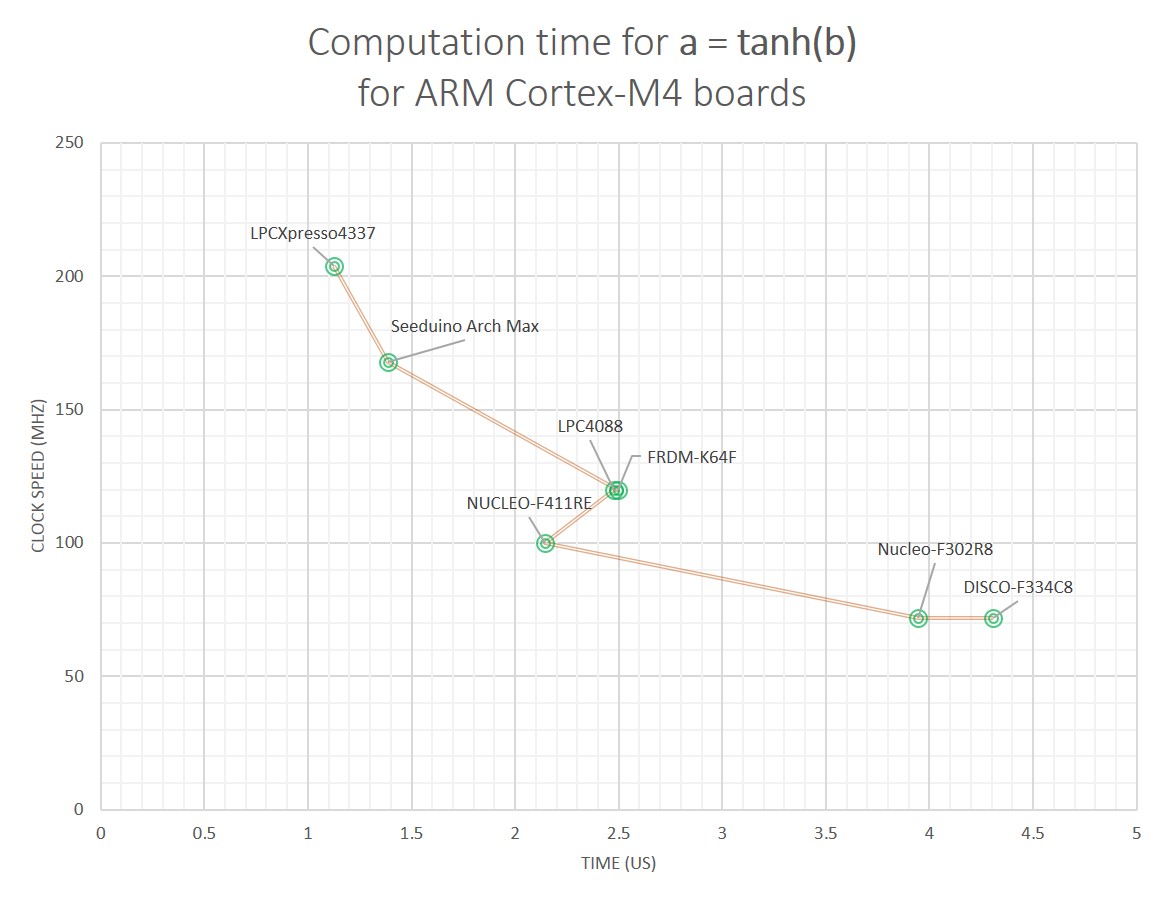Benchmarking test code for various operations
Fork of benchmark by
Benchmarking the performance of various mbed boards that I have
Using the excellent code by Igor, I have benchmarked the performance of the following platforms:
- mbed LPC1768
- mbed LPC11U24
- EA LPC4088 QuickStart Board
- mbed LPC1114FN28
- NUCLEO-F302R8
- FRDM-K64F
- NUCLEO-F411RE
- LPCXpresso4337
- Seeed Arch Max
- mbed LPC1768
The data can be found in this link: https://docs.google.com/spreadsheets/d/1d5BcNvC341xvktRJ6DC3wdlI6wuv0FjCvCqHAnfINmQ/pubhtml
For the hyperbolic tan (tanh) function, I made a graph showing how the clock speed of various ARM Cortex-M4 boards with FPU affects the computation time in microseconds.

Diff: main.cpp
- Revision:
- 1:f91e7bc0e244
- Parent:
- 0:6d89d8c13042
- Child:
- 2:fc68d524dd7d
--- a/main.cpp Mon Dec 06 22:37:52 2010 +0000
+++ b/main.cpp Mon Aug 17 20:14:39 2015 +0000
@@ -1,4 +1,6 @@
#include "mbed.h"
+
+//https://developer.mbed.org/users/igor_m/code/benchmark/
/* This program determines the time it takes to perform floating point
and integer operations.
To determine the time it takes, a Timer is used to measure the time
@@ -8,16 +10,17 @@
To increase accuracy of the results, an empty for loop is timed to determine
the loop overhead and the overhead is subtracted from the time it takes to
complete the operation loop.
+*/
- */
#define ITERATIONS 1000000 // Number of calculations.
-#define CLOCK 96 // Clock freqency in MHz
+#define CLOCK 100 // Clock freqency in MHz
Timer timer; // Timer..
Serial pc(USBTX, USBRX);
float number_of_cycles, single_operation_time;
-volatile float a, b,c; // Float operands and result. Must be volatile!
-//volatile int a, b,c; // Int operands and result. Must be volatile!
+//volatile int a, b, c; // Int operands and result. Must be volatile!
+volatile float a, b, c; // Float operands and result. Must be volatile!
+//volatile double a, b, c; // Float operands and result. Must be volatile!
int main() {
@@ -27,9 +30,9 @@
timer.reset(); // Reset timer
timer.start(); // Start timer
- pc.printf("Operations in progress.. May take some time.\n\n");
+ pc.printf("Operations in progress.. May take some time.\r\n");
/* Determine loop overhead */
- for (i=0; i<ITERATIONS; i++);
+ for (i=0; i<ITERATIONS; i++){}
for_time=timer.read_us();
timer.stop();
@@ -39,14 +42,18 @@
/* The operation takes place in the body of
this for loop. */
-
- for (i=0; i<ITERATIONS; i++) {
+ for (i=0; i<ITERATIONS; i++){
- c=a+b;
- //c=sin(a);
- //c=sqrt(a);
+// a = b;
+// c = a+b;
+// c = a*b;
+// c = a/b;
+// a = sqrt(b);
+// a = log(b);
+// a = tanh(b);
}
+
total_time=timer.read_us();
operation_time = total_time-for_time; // Calculate the time it took for the number of operations
@@ -54,9 +61,9 @@
single_operation_time=float(operation_time)/float(ITERATIONS);
number_of_cycles = single_operation_time*CLOCK;
- pc.printf("for overhead: \t\t%dus \n", for_time);
- pc.printf("total time: \t\t%dus \n\n", total_time);
- pc.printf("%d calculations took:\t%dus \n", ITERATIONS, operation_time);
- pc.printf("single operation took: \t\t%fus\n", single_operation_time);
- pc.printf("single operation took: \t\t%.3f cycles\n", number_of_cycles);
+ pc.printf("for overhead: \t\t%dus \r\n", for_time);
+ pc.printf("total time: \t\t%dus \r\n", total_time);
+ pc.printf("%d calculations took:\t%dus \r\n", ITERATIONS, operation_time);
+ pc.printf("single operation took: \t\t%fus \r\n", single_operation_time);
+ pc.printf("single operation took: \t\t%.3f cycles \r\n", number_of_cycles);
}
